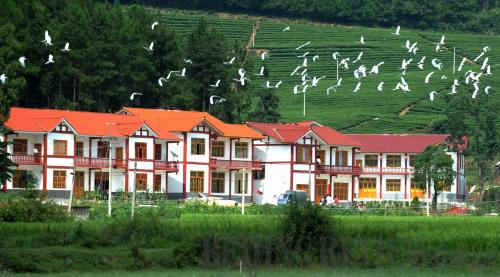|
 |
|
A NEW START: New houses have been built on the plains for farmers in Songyan Town in Zunyi City, southwest China's Guizhou Province since 2008 (OU DONGQU) |
Two years ago, when Wang Chengxiang, a farmer from the mountainous area of Qingchuan County in southwest China's Sichuan Province, was helpless in getting his house rebuilt after the devastating Wenchuan earthquake in May 2008, one of his relatives convinced him to move to Huijue Town in Luojiang County, Deyang City in the province.
In the town, there was a two-storey house abandoned by a farmer who moved to the city 10 years ago. Wang bought the house for 46,000 yuan ($6,921), and started his new life there.
According to statistics from local governments, more than 5,200 farmers in Qingchuan have resettled in other areas after the Wenchuan earthquake. In Kaixian County in Chongqing Municipality more than 3,500 farmers have moved to plain areas from mountainous areas since October 2009.
Day to day struggle
On April 10, Lan Yinghai, a farmer at Muzu Village in Hanniu Town in Sichuan's Xiaojin County, was fretting at his undecorated new house.
The village is located on a 3,200-meter-high mountain. After the Wenchuan earthquake, the government encouraged local farmers to rebuild their damaged houses. Each household could receive 20,000 yuan ($3,077) in subsidies and borrow another 20,000 yuan from the bank. Lan didn't want to lose this chance. On top of the subsidy from the government and the loan from bank, he also borrowed another 20,000 yuan from his friends and relatives. But, after building the house, he had no more money to decorate it.
"The house was completed in April 2009, but my family is still unable to move in, because I don't have enough money with my little earnings to furnish it," said the 39-year-old Lan, adding except limited fields on a hill, there are few chances for farmers like him to make money living in mountains.
There are four members in Lan's family but they only have 0.4 hectares of farmland.
"We cannot make extra money from the farmland because the grain yields are just enough to satisfy my family's needs," Lan said.
Compared to Lan, the living conditions of his fellow villager Yang Xuede are even worse. In order to get easy access to water, Yang built his house near the river running through the valley at Muzu Village.
In the dry season, it is convenient for the family to live there. But, when the rainy season comes, the area becomes dangerous.
"In 1997, there was a mudslide and we were scared to move to a place far from the river. In 2008, a bigger mudslide damaged half of my family's 0.4 hectares of farmland and pushed the river to the front of my door. Since last year, we have to move to a relative's house in the rainy seasons," Yang said.
Hanniu lies deep in the Qionglai Mountains and local farmers live between 2,800 meters and 4,800 meters above sea level. Traffic here is very inconvenient and geological disasters often occur. Each year, seven to eight big mudslides hit the town and the government has to spend 400,000 yuan-500,000 yuan ($61,543-$76,929) to repair damaged roads.
Lan said local villagers had long dreamed of leaving the impoverished mountainous areas and moving to plain areas. "But we have no place to go. Even if we have a place to move in, we still do not have enough money to build new houses," said Lan.
The situation of Hanniu is the epitome of the hard life led by farmers living in poverty-stricken mountainous areas and geological disaster-prone areas in China's vast western regions.
Yong Tianxiong, Director of the Poverty Alleviation Office of Qingchuan County, said all farmers living in uninhabitable areas should be relocated to other habitable places. "But it is a huge challenge to the government to provide houses for the expected tens of millions of farmers moving out of mountains," he said.
| 